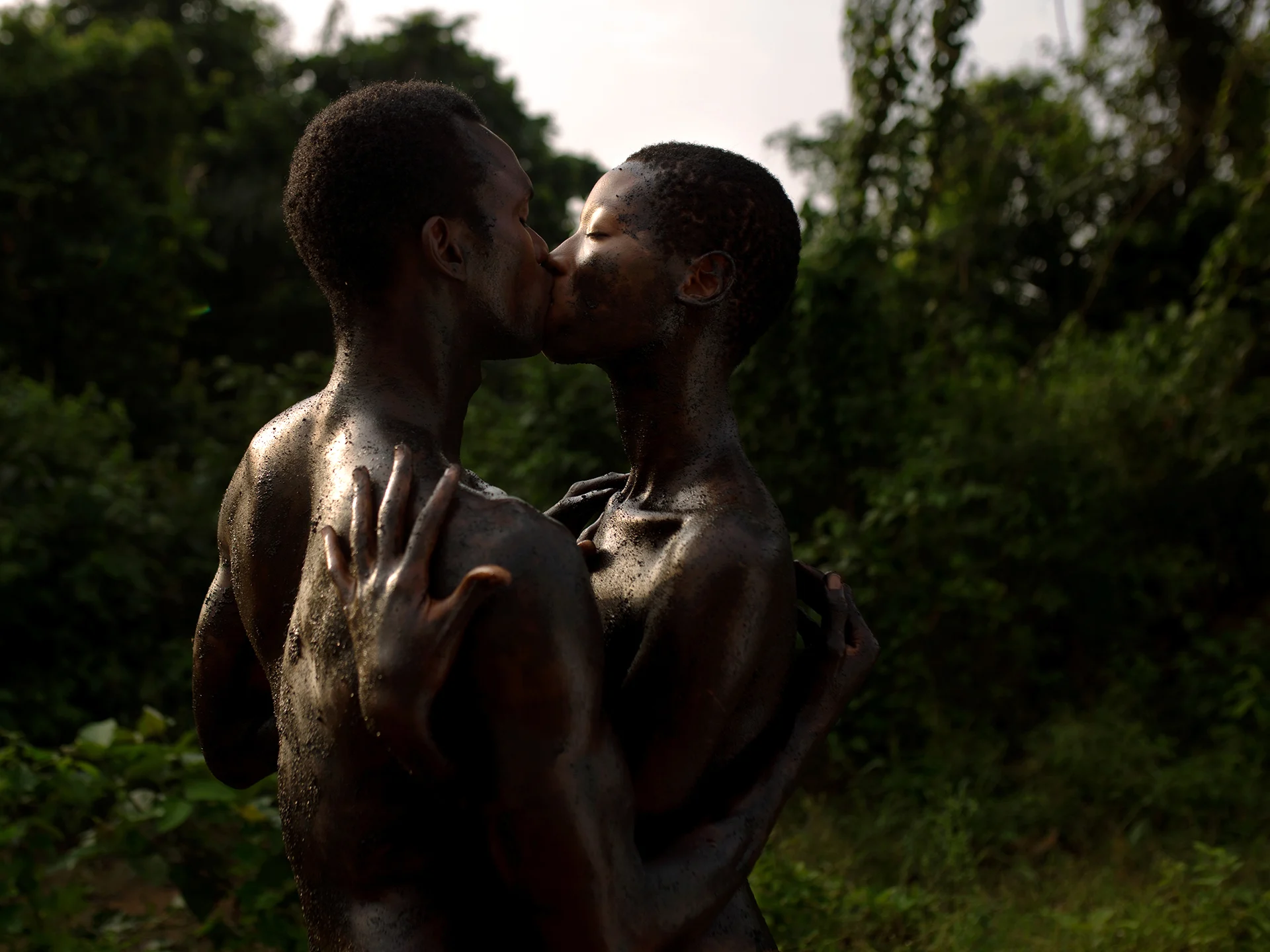


Inside our collaboration with the photographer in Nigeria
An unstoppable energy is stirring in Nigeria. Photographer David Uzochukwu went to capture young Nigerians who are shaping the country’s vibrant creative scene.
He wanted to create “a fictional Nigerian Pompeii” which he would populate with “people who are crystallizing within Nigerian society, and leaving a blazing trail in their wake.” Niellah Arboine spoke to him about this new Nigerian narrative.

There’s a real maturity to David Uzochukwu and his photography. At only 20, the Austrian image-maker has refreshing wisdom beyond his years and talks about his work with meticulous thoughtfulness.
David has already made a name for himself with his vulnerable, serialist style of portraiture, and he’s shot famous artists like FKA twigs, Pharrell Williams and Ibeyi. With their hazy hues and a certain softness, every image tells – or rather suggests – a story and leaves us thirsty to find out more.
His new project, Pluton, is a celebration of Nigerian creatives and their resilience and strength whilst making, creating and pushing boundaries through their art. From performance artists and activists to dancers, models and filmmakers, each image encapsulates something special about its subject, captured in David’s memorable style.
I started talking to a few artists who were working and living in Lagos, and all of a sudden this whole new parallel of Nigerian society opened up to me.

They all share this energy of having to make things happen themselves.
It was an encounter in his hometown that sparked the idea. “I had an exhibition in Brussels,” he explains. “I started talking to a few artists who were working and living in Lagos, and all of a sudden this whole new parallel of Nigerian society opened up to me.”
David was familiar with the country – his father is Nigerian and he visits every year or two. “It feels like home because I know the culture,” he says. “Even though I grew up in the diaspora, my father was always connected to the Igbo community here (in Nigeria).”
This duality that comes from being a part of the diaspora shapes David’s work. “I don’t speak Igbo but the language feels so familiar, the food is familiar, the way people act is so familiar.”
Pluton gets its name from the igneous rock that’s created when hot magma rises to the Earth’s surface and slowly cools, crystallizing. It’s a fitting metaphor for the series, which David shot mainly an hour north of Lagos.
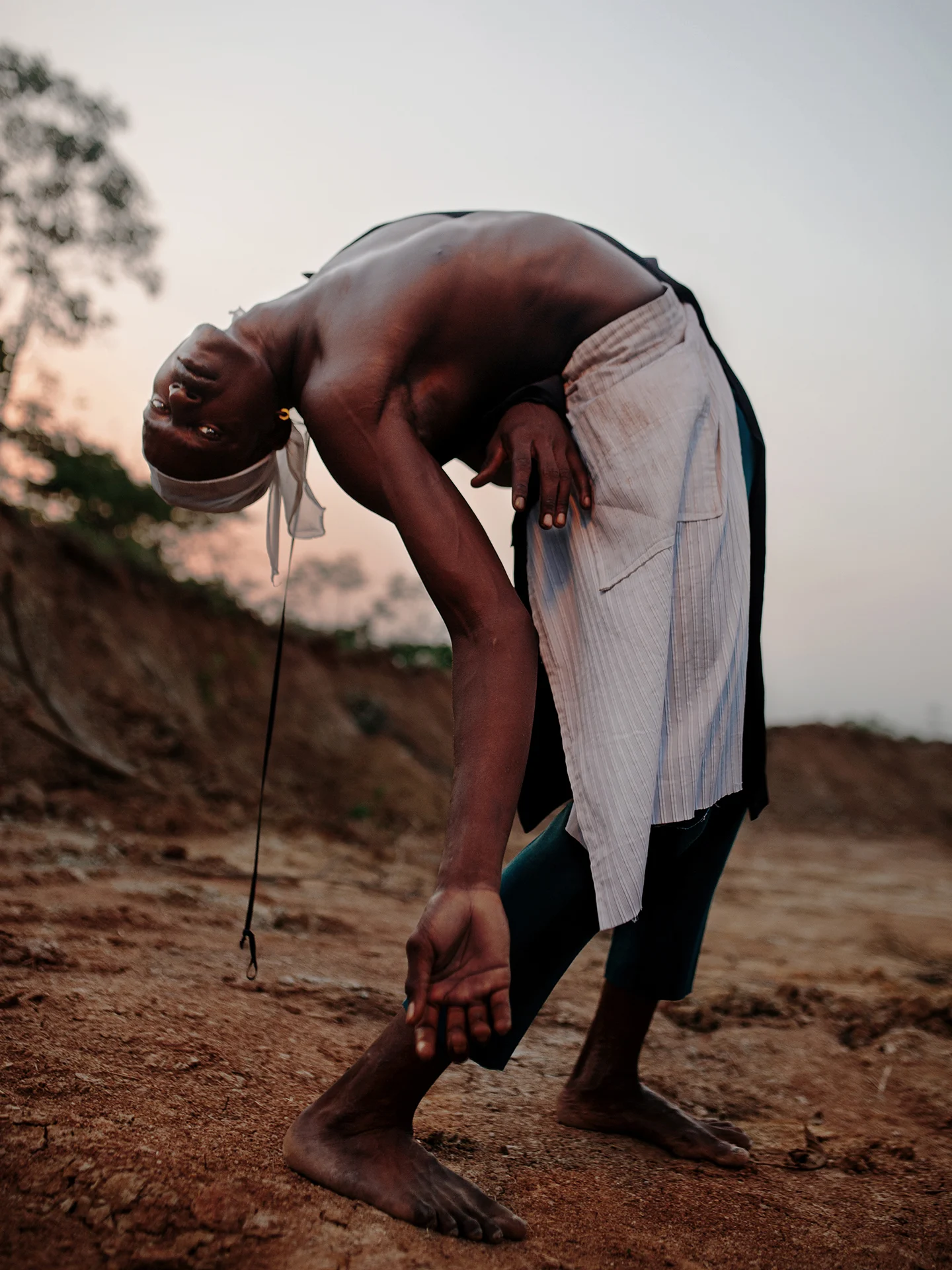

This notion of crystallization – “a kind of a disruptive element” – is at the epicentre of his project. These artists are crystalizing themselves into Nigerian culture and burning themselves into our memories. “They all share this energy of having to make things happen themselves,” he says.
The metaphor is visualized too, through the heat, soot, dust, smoke and encrusted earth that reoccurs, threading the images together. And David uses light so delicately in each image. He talks poetically about the “blue hour in the morning” and the “red dusk.” The lighting on each subject’s skin is superb and very intentional. “I was very aware that it was common practice within photography to not properly light black people and to represent them as darker than they are,” he explains. “It dehumanizes them because we’ve associated blackness as something less.”
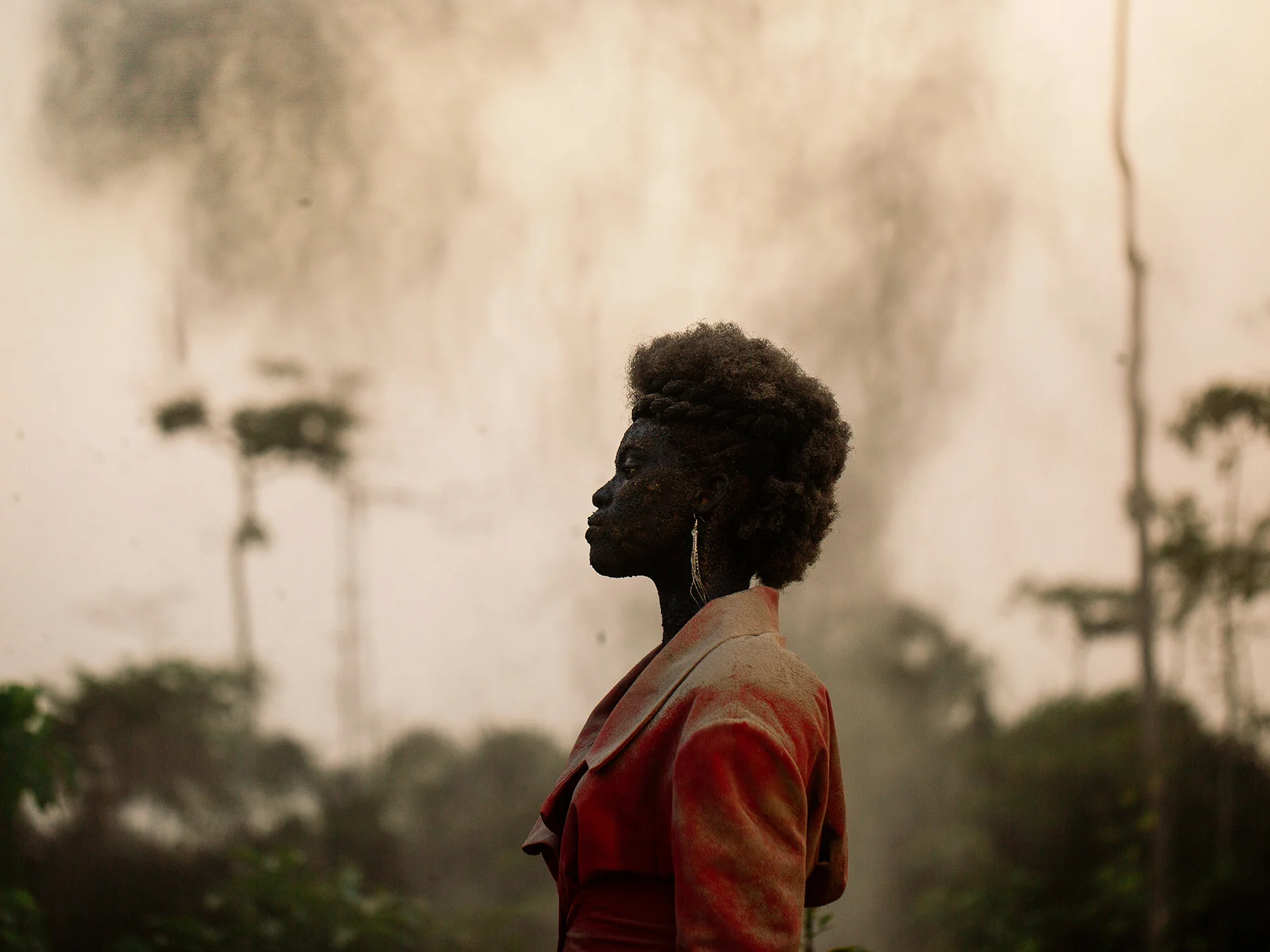
I don’t know if it’s destroying me, or bringing something out.
Yadichinma Ukoha-Kalu, a self-taught experimental artist, is seen posing in what feels like the most apocalyptic of the images. She stands firm, an unphased, almost nonchalant expression on her soot-encrusted profile. Behind her, blurred trees and pools of smoke give a sense of destruction, like a scene from Pompeii. It’s like Yadichinma knows this destruction well and is unafraid.
“Lagos is a lot,” David says. And even though he was able to “dip in and out of the world every now then” he admits the city can be both “exciting and frustrating.”
In an interview on The Omenka podcast, Yadichinma said of Nigeria, “I don’t know if it’s destroying me, or bringing something out." This portrait captures that struggle too.
Performing artist Hermes Chibueze Iyele is photographed with his head up, eyes shut surrounded by the night sky – “a shower of sparks emanate from him.” A protégé of world-renowned choreographer Onikeku Qudus, Hermes now dances with the IWAL’EWA collective. David shoots him mid-dance as well, capturing his “strength as vulnerability.” We are confronted with the power and delicacy of his body as he contorts himself into an almost unnatural backbend, commanding the image.

Multimedia artist Tito Aderemi-Ibitola, whose work focuses on the intersection of race, gender and ethnicity, is shot standing high up by a tree, with smoke billowing from her head. “I previously made an image where a woman's hair kind of turns to smoke and I really wanted to revisit that in a larger context,” David says.
That meant he now had to analyze techniques he often uses in his work, like using nature as a setting. “There’s something really interesting about putting black people outside of these very urban contexts, and it's what I always do whenever I photograph people,” he says. But in the context of an African country where the West already perpetrates problematic assumptions that there are no urban spaces, shooting in nature can take on a new meaning.
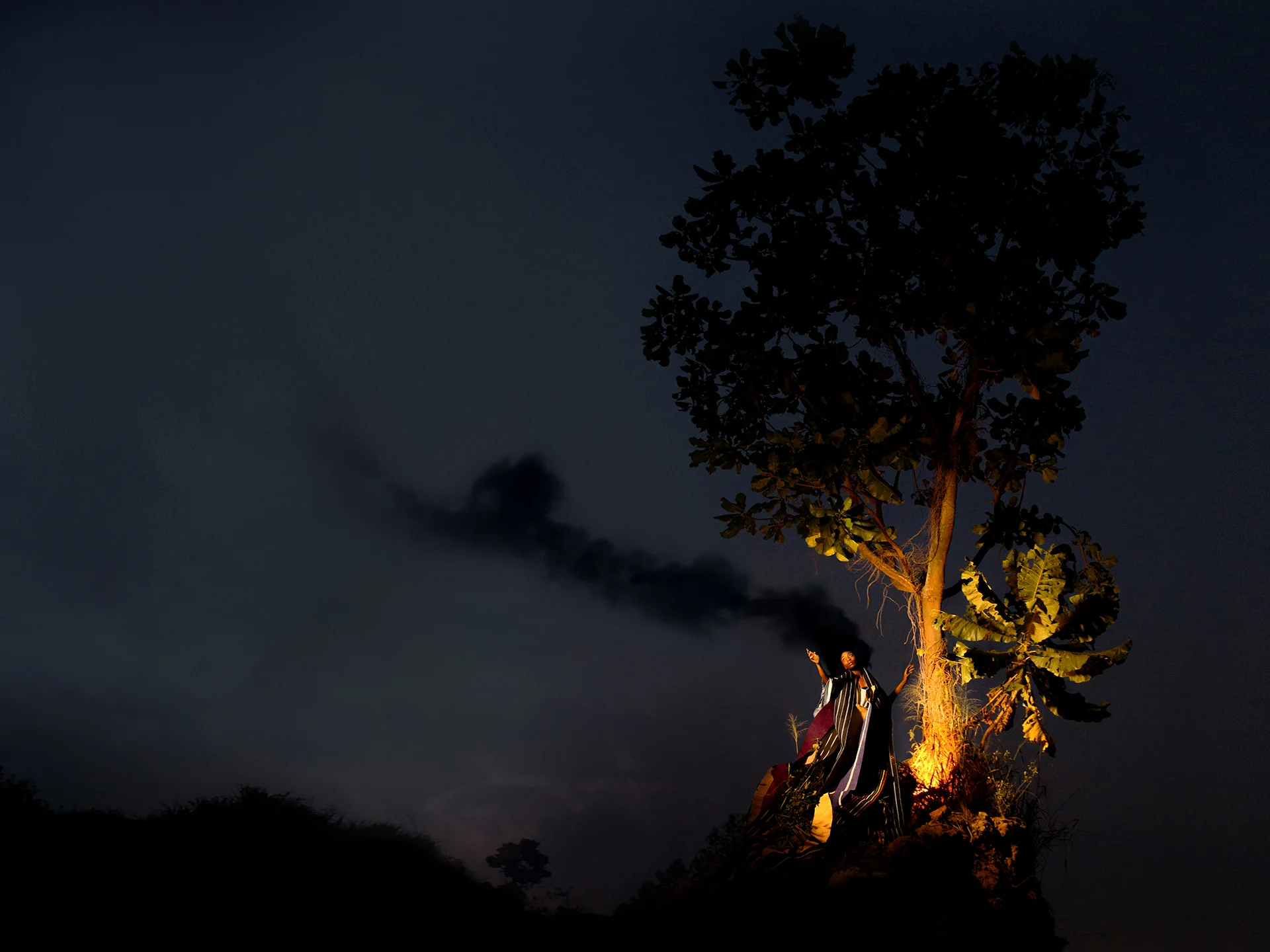
This kind of sensitivity runs throughout the project. Although his family is Igbo, David is aware of his European upbringing and how that places him in this context. “I have an Austrian passport; I grew up in Europe,” he says. “I mean literally, I’m an outsider coming in.”
He was cautious about “stepping into the space and eventually profiting from these people's and stories.” Clearly this played on his mind. His own background didn’t give him a free pass in a continent that has historically been misrepresented, homogenized and belittled by artists. “I've never thought more about the implications, on a social level, than I have working on this project,” he explains.
I was like, okay, hold on, how is this going to feel if I’m putting black people in nature? I felt very aware.

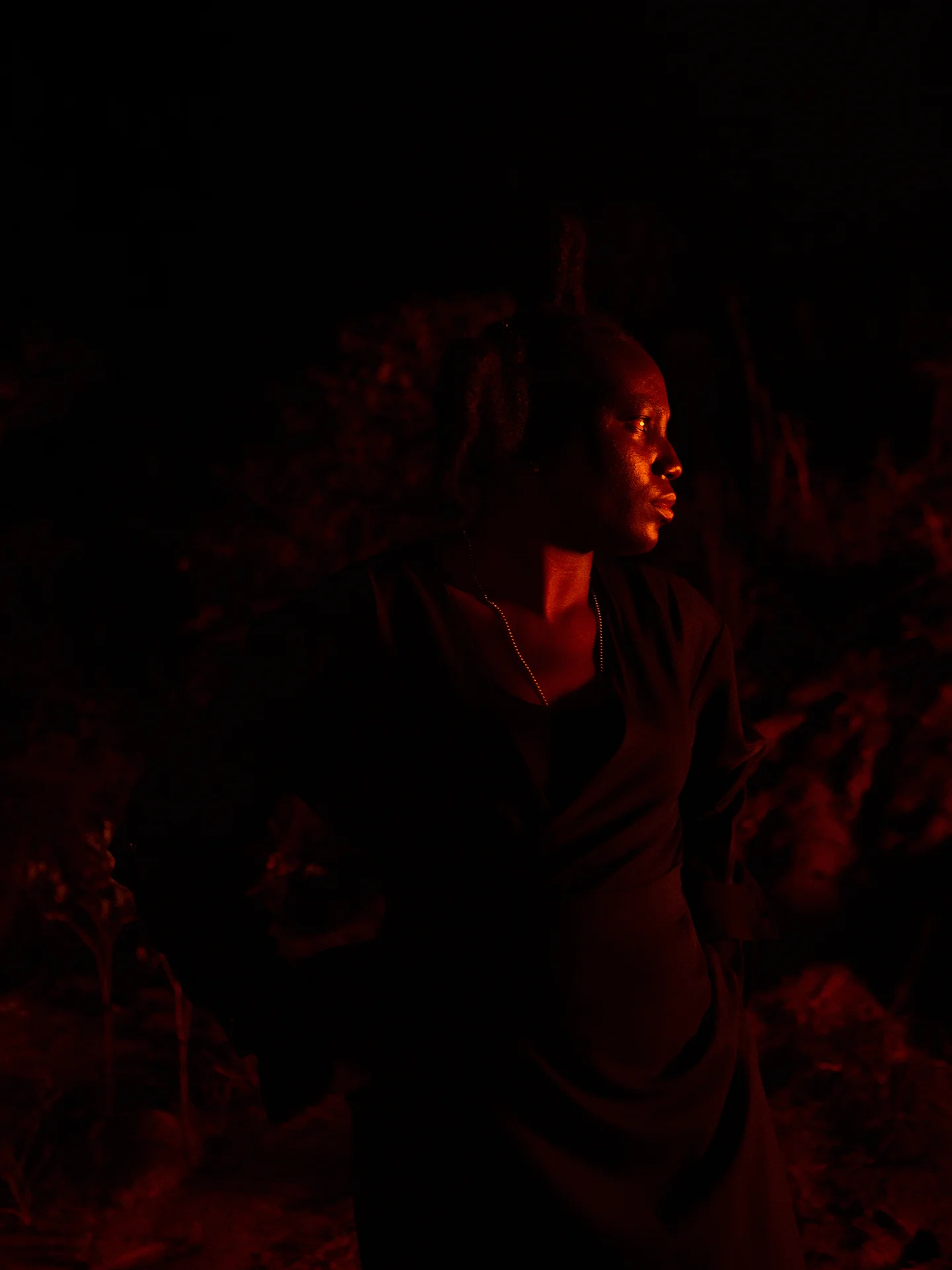
For someone who’s already been so celebrated, and cemented his reputation at such a young age, David is still very humble, and respectfully thoughtful with his creative process. It’s this constant awareness and self-evaluation that makes his work so special. He obviously cares a lot about the artists in Pluton, and he makes the series as much, if not more, about them, their practice and respecting Nigeria, as he does about himself.
I asked how he feels about showing the subjects their portraits, David giggles. “I’m super scared.” But he needn’t be – Pluton is a touching, at times dark, but fearlessly beautiful representation of these exceptional artists.
